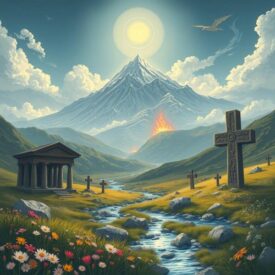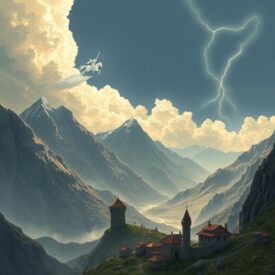Caucasus Mythology
Caucasus mythology is a fascinating blend of legends, gods, spirits, and epic heroes that emerged from the rugged landscapes of the Caucasus Mountains, a region that bridges Europe and Asia. Shaped by the cultures of diverse peoples including the Georgians, Circassians, Abkhazians, Armenians, Ossetians, and many others, the mythology reflects the natural environment of towering peaks, deep forests, and mysterious caves. It is a tradition marked by powerful deities, legendary warriors, and mythical creatures that often symbolize the struggle between order and chaos. Unlike more widely known mythologies such as Greek or Norse, Caucasus mythology remains relatively lesser-known outside its homeland, but it continues to reveal an incredibly rich spiritual world filled with timeless tales and archetypes.
The central themes of Caucasus mythology often revolve around survival, heroism, and the eternal struggle against supernatural forces. Gods and spirits were frequently tied to natural elements, with mountains, rivers, and storms personified as divine or semi-divine beings. Among the most prominent are the Narts, legendary heroes celebrated across many ethnic groups in the Caucasus. Their epic cycle, known as the Nart Sagas, rivals other global heroic traditions in scope and influence. The Narts embody qualities such as bravery, loyalty, and cunning, and their stories often reflect the values of courage and resilience that were essential to life in the harsh mountain terrain. These myths were not only entertainment but also a way to pass on lessons, morality, and cultural identity through generations.
Caucasus mythology is also deeply tied to ritual practices and folk traditions that still survive today. Festivals, dances, and songs often have roots in these ancient stories, connecting modern communities to their mythological past. Spirits of fertility, agriculture, and protection continue to appear in folk customs, symbolizing the enduring role of mythology in everyday life. Deities associated with fire, the sun, and the hunt were central to many rituals, and mythical creatures such as dragons or giants frequently appeared as antagonists to human heroes. These beings symbolized the challenges of nature and fate, while the heroes represented human determination to overcome them. The mythology also incorporates cosmological ideas, offering explanations for the origins of the world, the role of the gods, and humanity’s place within the natural order.
In the modern day, Caucasus mythology remains an essential part of cultural heritage and identity for the peoples of the region. Scholars, artists, and writers continue to explore these legends, ensuring their preservation and reinterpretation for contemporary audiences. Epic tales like the Nart Sagas are recognized as some of the most important oral traditions in the world, comparable to Homer’s Iliad or the Indian Mahabharata. With its mix of unique local traditions and influences from neighboring civilizations, Caucasus mythology provides a window into the ancient spiritual life of a region at the crossroads of continents. As more people discover its depth and diversity, this mythology gains recognition not only as folklore of the Caucasus but as a significant contribution to the global heritage of myth and legend.





